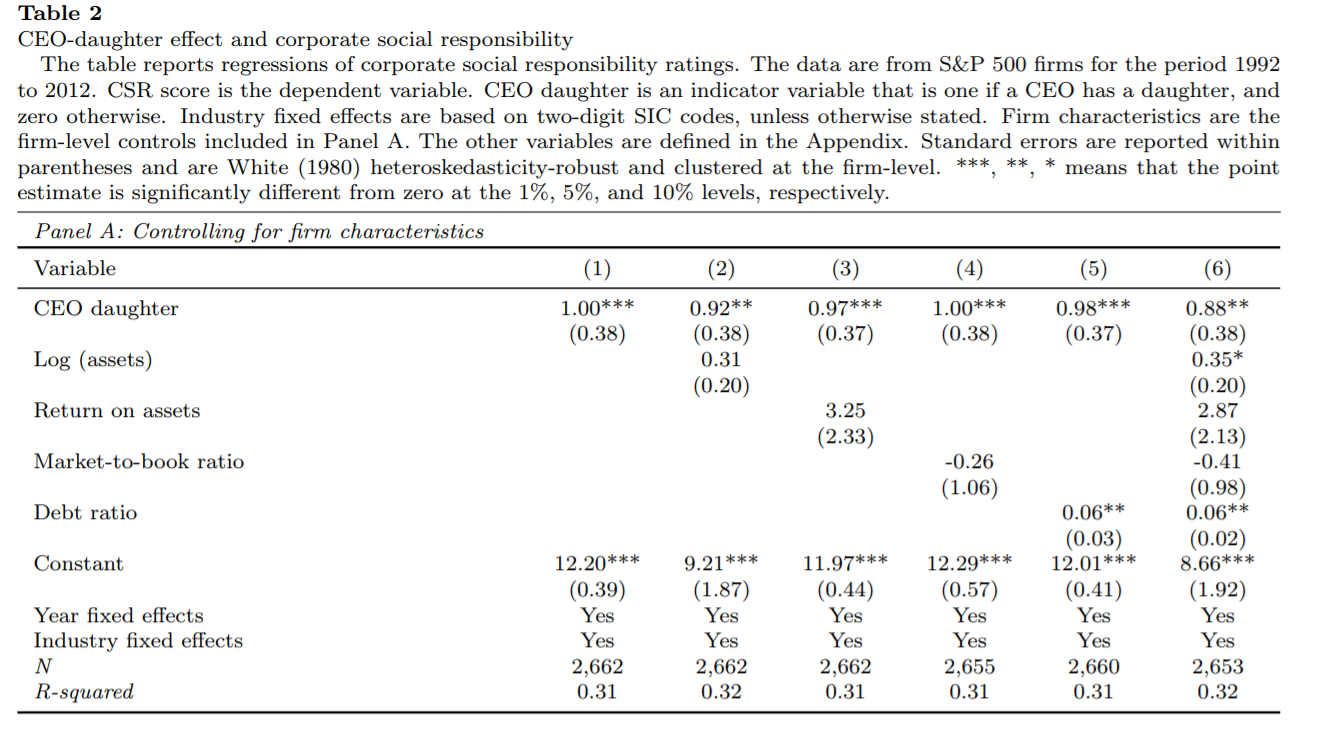Shaped by their daughters: Executives, female socialization, and corporate social responsibility
- Henrik Cronqvist, Frank Yu
- A version of this paper can be found here
- Want to read our summaries of academic finance papers? Check out our Academic Research Insight category.
What are the research questions?
- Does a top decision makers’ (CEOs) family environment have a real impact on the firm they manage? Specifically, is there a CEO-daughter effect in the context of corporate social responsibility policies? That is, do male CEOs with daughters exhibit a higher propensity of managing firms that engage more in pro-CSR practices?
What are the Academic Insights?
By studying the largest public firms in the US from 1992 to 2012 and hand-collecting information on CEOs’ children, the authors find what follows:
- Yes, there is an economically sizeable and statistically significant relationship between a CEO parenting a daughter and corporate social responsibility policies. In particular, the CSR rating of a firm is 9.1% higher, compared to a medium firm, when a firm’s CEO has a daughter. In other words, the median firm with a CEO who has a daughter spends 10.4% per year of the firm’s net income on corporate social responsibility ( about an extra $43.5 million per year). An interesting corollary is that out of several CSR categories, the effects are stronger for Diversity, Environment, and Employee Relations
This result is robust to several endogeneity concerns.
Why does it matter?
This study is the first to emphasize the importance of the family environment in shaping CEOs. (Here is another piece on the subject).
The Most Important Chart from the Paper

The results are hypothetical results and are NOT an indicator of future results and do NOT represent returns that any investor actually attained. Indexes are unmanaged and do not reflect management or trading fees, and one cannot invest directly in an index.
Abstract
Corporate executives managing some of the largest public companies in the U.S. are shaped by their daughters. When a firm’s CEO has a daughter, the corporate social responsibility rating is about 9.1% higher, compared to a median firm. The results are robust to confronting several sources of endogeneity, e.g., examining first-born CEO daughters and CEO changes. The relation is strongest for diversity, but significant also for broader pro-social practices related to the environment and employee relations. Our study contributes to research on female socialization, heterogeneity in CSR policies, and plausibly exogenous determinants of CEOs’ styles.
About the Author: Wesley Gray, PhD
—
Important Disclosures
For informational and educational purposes only and should not be construed as specific investment, accounting, legal, or tax advice. Certain information is deemed to be reliable, but its accuracy and completeness cannot be guaranteed. Third party information may become outdated or otherwise superseded without notice. Neither the Securities and Exchange Commission (SEC) nor any other federal or state agency has approved, determined the accuracy, or confirmed the adequacy of this article.
The views and opinions expressed herein are those of the author and do not necessarily reflect the views of Alpha Architect, its affiliates or its employees. Our full disclosures are available here. Definitions of common statistics used in our analysis are available here (towards the bottom).
Join thousands of other readers and subscribe to our blog.

